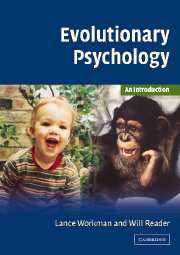Book contents
- Frontmatter
- Contents
- List of figures
- List of tables
- 1 Introduction to evolutionary psychology
- 2 Mechanisms of evolutionary change
- 3 Sexual selection
- 4 The evolution of human mate choice
- 5 Cognitive development and the innateness issue
- 6 Social development
- 7 The evolutionary psychology of social behaviour – kin relationships and conflict
- 8 The evolutionary psychology of social behaviour – reciprocity and group behaviour
- 9 Evolution, thought and cognition
- 10 The evolution of language
- 11 The evolution of emotion
- 12 Evolutionary psychopathology and Darwinian medicine
- 13 Evolutionary psychology and culture
- Glossary
- References
- Index
- References
6 - Social development
- Frontmatter
- Contents
- List of figures
- List of tables
- 1 Introduction to evolutionary psychology
- 2 Mechanisms of evolutionary change
- 3 Sexual selection
- 4 The evolution of human mate choice
- 5 Cognitive development and the innateness issue
- 6 Social development
- 7 The evolutionary psychology of social behaviour – kin relationships and conflict
- 8 The evolutionary psychology of social behaviour – reciprocity and group behaviour
- 9 Evolution, thought and cognition
- 10 The evolution of language
- 11 The evolution of emotion
- 12 Evolutionary psychopathology and Darwinian medicine
- 13 Evolutionary psychology and culture
- Glossary
- References
- Index
- References
Summary
Key concepts life history theory, attachment styles, C–F continuum, principle of allocation, shared environment, non-shared environment, behavioural genetics, group socialisation theory, moral development
The Standard Social Sciences Model (SSSM) has dominated the thinking of developmental psychologists for the past 100 years. Taking their cue from Freud, many researchers have seen early environmental experiences – especially those within the family – as crucial in shaping an individual's personality, intelligence and values. Darwinian thinking did influence a few developmentalists, however. John Bowlby, for instance, proposed that the child is born with certain biological needs and that normal development is dependent upon these needs being met. Failure to do so could result in a wide range of problems in later life including criminality, intellectual under-achievement, promiscuity and psychological disturbances. More recently an evolutionary approach known as life history theory has been used to understand human development. This perspective suggests that some individual differences might be the result of children deploying different evolutionary strategies based on their childhood environment. Behavioural genetics research has also been crucial in unravelling the effects of nature and nurture on the developing child. Some evidence suggests that, in contrast to the SSSM view of development, parental influence might not have such a large impact on development. This has led to a controversial theory which states that socialisation is carried out in peer groups. Finally we also discuss evolutionary approaches to moral development presenting research that suggests that the function of the moral sense is to enable us to exist in groups with non-kin.
- Type
- Chapter
- Information
- Evolutionary PsychologyAn Introduction, pp. 139 - 171Publisher: Cambridge University PressPrint publication year: 2004



